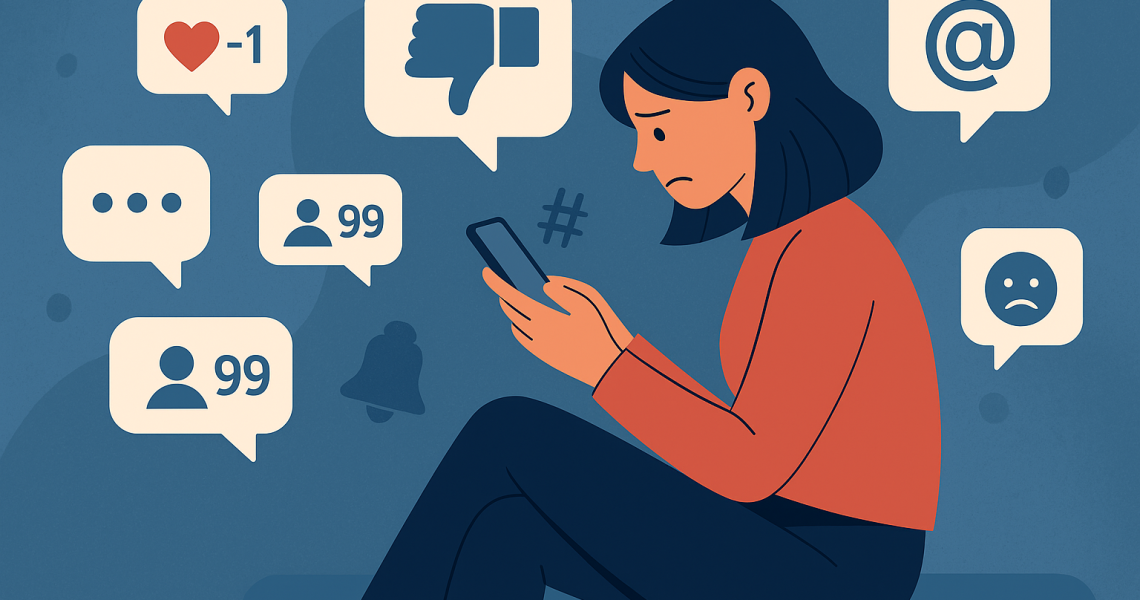You’ve probably noticed: as soon as you open your phone, a notification pops up, a video launches, a story appears. Within minutes, you’re hooked. But behind these now commonplace gestures lies a disturbing question: what if social networks, which are supposed to bring us closer together, are actually undermining our mental and emotional equilibrium?
A promise of connection… that isolates
When they were born, social networks promised to bring us closer together, to enable us to keep in touch and share our experiences. Yet more and more studies are revealing a paradox: the more time we spend connected, the more lonely we feel.
Why? Because social comparison is constant. As you scroll down, you see friends traveling, succeeding, smiling. And even though you know that everything is filtered, arranged and retouched, a little voice whispers to you: “Why not me? This spiral feeds self-doubt and weakens your self-esteem.
The invisible cost to our mental health
Digital stress and anxiety are real. The most common symptoms?
- Disturbed sleep: blue light from screens delays sleep and reduces the quality of rest.
- Cognitive fatigue: switching from one content to another exhausts attention. As a result, it becomes more difficult to concentrate, to learn, or even to hold a deep conversation.
- Latent anxiety: the famous FOMO(Fear Of Missing Out), the fear of missing a piece of information, an event or a message, maintains a permanent state of vigilance.
Over time, these micro-stresses accumulate and weigh heavily on the psychological balance.
When sweet addiction sets in
What’s most disturbing is that many users don’t even realize they’re addicted. We’re not talking about a sudden withdrawal, as with a substance, but a subtle restlessness: the compulsive need to check notifications, to glance “just two minutes” at the news feed.
And that’s no accident. Platforms are designed to capture attention: infinite scrolling, random rewards (likes, shares), short, punchy content. Everything is designed to make us stay.
A collective and economic impact
Beyond the individual, these behaviors have a cost for society. Every hour wasted scrolling aimlessly is time taken away from productivity, learning and rest. The consequences also translate into health costs: psychological consultations, anti-anxiety treatments, work stoppages linked to digital stress.
More and more governments and institutions are beginning to quantify these effects, revealing amounts that are no longer anecdotal.
Regaining control: a matter of choice
The good news is that we’re not doomed. Social networks are not intrinsically bad. They become harmful when they dictate our behavior instead of serving us.
Here are a few concrete ways to get back to balanced use:
- Define screen-free times: for example, no phone use for 1 hour before bedtime.
- Notification settings: allow only the essentials.
- Be selective: follow accounts that inspire, that bring value, rather than those that fuel comparison.
- Schedule your connection times: rather than opening your phone automatically, decide on specific times to consult your applications.
Conclusion: become a player again
The question is not whether we should do away with social networks, but rather: how can we regain control of them?
They can be a wonderful tool for information, creativity and connection. But only if we use them consciously.
So, the next time you pick up your phone, ask yourself this simple question: “Do I choose, or does the algorithm choose for me?”. The answer will determine whether you’re a spectator… or an actor in your balance.
